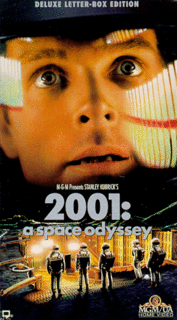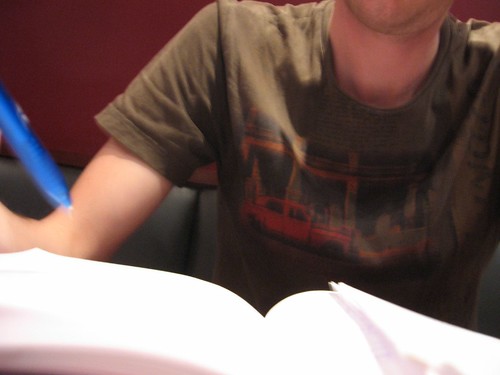Well, talking about the film made me want to watch it again, so decided that I would tonight. On getting back from work I went and posted my time sheet and as I was walking back home I passed the library and finally decided it was time to venture inside. Partly because helen c had said that sheffield library had a very good selection of films on dvd. They didn't have 2001 in, but I decided on getting a book, cos otherwise my joining the library might've appeared a waste of time to the librarian. Not sure I'll get round to reading it as I'm quite enjoying that bill bryson book.

So back to 2001, I dug out an old video, as I'd videoed it off channel 4 about ten years ago. On long play, so the picture quailty was pretty awful. Actually, keeping a programe so long on video is actually breaking the law. The film is stunning, and I just wonder what the original audience made of it all. I remember the first time I saw it being quite perplexed. Blokes dressed as apes milling around for about 20 minutes, strange monoliths, incredible ideas of space travel, computers going wrong and then the weirdest psychedelic sequence I've ever seen. Later grasping the story better and reading Arthur C Clarkes works I've grown to really appreciate this film. The ideas of something instigating great changes in the evolution of community, here the invention of tools and later in the series the growth of a second sun. Then questions of artificial intelligence, how a computer would deal with two conflicting assignments. Then the quite moving scene of the 'death' of artificial intelligence. I was also sure that the last words spoken by Dave Bowman on entering the monolith was "My God, it's full of stars", but it wasn't. They're the last words in the novel, and are used in the sequal 2010. In conclusion, this film is a peice of visionary masterwork, as you'd expect from Stanley Kubrik. The input from Arthur C Clarke gives a certain 'believability' to the space scenes, this is a man who predicted the use of geostationary satalites, velcro to walk in zero gravity conditions and spinning space stations that generate a pseudogravity through centrifugal force. It's well worth watching if you haven't seen it before.

No comments:
Post a Comment